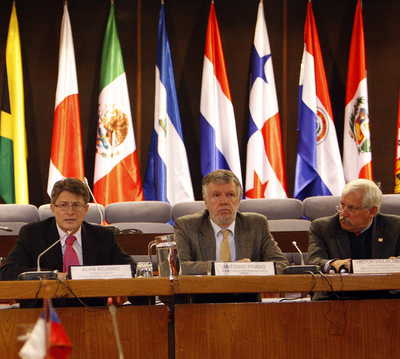South America Must Take Advantage of High Food Prices in Order to Reduce Inequality
Topic(s)
Representatives from South American governments agreed to develop a joint agenda on the main challenges posed by food price hikes and volatility.

(9 June 2011) South America should take advantage of high food prices to reduce inequality and strengthen its strategic position as a world provider of food products, according to senior government representatives from the subregion attending a two-day meeting on food price hikes and volatility organized by ECLAC, FAO and IICA in Santiago, Chile.
According to Antonio Prado, Deputy Executive Secretary of the Economic Commission for Latin America and the Caribbean (ECLAC): "For countries of the Southern Cone, which are exporters of raw materials, the challenge is to take advantage of the current high prices to lay the foundations for a more diversified and inclusive economy, while appropriately managing the volatility and risks associated with currency appreciation. Economic growth must translate into quality employment and an equitable distribution of wealth".
In the current climate, although South America has huge opportunities to play a key role in worldwide food supply, the subregion should not lose sight of the impact that prices have on the most vulnerable.
Alan Bojanic, the Representative of the Regional Office for Latin America and the Caribbean of the FAO, stated that "It is the poorest who suffer the worst effects of food price rises and volatility, and they must be at the heart of our public policies. Because of its natural resources and knowledge, South America is in a privileged position of satisfying internal food demand while also strengthening its position as breadbasket of the world".
Another challenge identified by countries as being essential for tackling crop price volatility is to generate transparent and open markets, while encouraging interregional trade and strengthening domestic markets, especially in the area of rural employment (which is characterized by informal jobs and a lack of job security).
In the words of Víctor Villalobos, Director General of the Inter-American Institute for Cooperation on Agriculture (IICA) "The price of the basket of staple foods has risen so much in some countries that it has overtaken minimum wages. Countries have implemented short- and long-term measures to protect the most vulnerable and sustainably increase agricultural productivity. However, there is still a need for a regional strategy at the highest level".
There is a consensus that responding to the challenge of food price hikes and volatility, as well as meeting the growing demand for food in an environmentally sustainable way, involves a coordinated combination of agricultural, economic and social policies, as well as increased investment in agriculture and innovation.
Minister, Secretary General of the Presidency of Paraguay, Hugo Royg, stated that "How we seek mechanisms to ensure everyone has access to food must be one of the priorities for debate in the region", adding that "we must strengthen the link between social life and economic life".
To tackle this and other issues, the countries and international agencies gathered at the ECLAC headquarters in Santiago, Chile, drew up a common agenda of topics with a view to safeguarding regional food security and transforming South America into a major player in terms of world food supply.
The joint agenda includes the strengthening of family farming and social safety nets, food safety and the creation of monitoring and alert mechanisms on food price trends and food security.
Next week, another two intergovernmental dialogues will be held on food price hikes and volatility: one in the Caribbean (13 and 14 June in Trinidad and Tobago) and another in Central America (15 and 16 June in El Salvador), as part of a series of 14 seminars that FAO is organizing on the topic worldwide.
The meeting in Santiago was attended by the Minister of Autonomy of the Plurinational State of Bolivia, Carlos Romero, Minister, Secretary General of the Presidency of Paraguay, Hugo Royg, as well as the Vice-Ministers for Agriculture, Rural Development, Family Farming, Social Development and Food Security and other senior figures from Argentina, the Plurinational State of Bolivia, Brazil, Chile, Ecuador, Paraguay, Peru, Uruguay and Mexico.
Also in attendance were representatives from the Inter-American Development Bank (IDB), the World Food Programme (WFP), the European Union, the Presidency of the Group of 20 (G-20) and non-governmental organizations associated with the agricultural sector.
Press contacts:
ECLAC
ECLAC Public Information and Web Services Section. dpisantiago@cepal.org; (56 2) 210 2040.
Follow us on: Twitter , Facebook , Flickr and YouTube.
FAO
Lucas Tavares: lucas.tavares@fao.org, (56-2) 923 2314, (56 9) 9802 7300
Cristián Albagly: cristian.albagly@fao.org; (56-2) 923 2176
RLC-Prensa@fao.org
Follow us on www.twitter.com/FAONoticias
IICA
Patricia León: patricia.leon@iica.int (506) 2216 0310
Follow us on www.twitter.com/IICAnoticias
Country(ies)
- South America
Contact
Public Information Unit
- prensa@cepal.org
- (56 2) 2210 2040